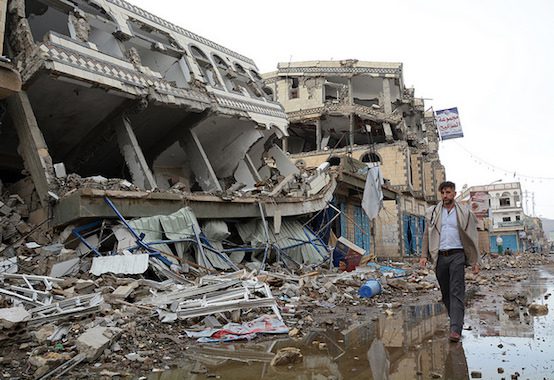There Is No Accountability for Destructive Policies

Patrick Porter has written an incisive and damning review of Samantha Power’s memoir. Like other reviewers, he remarks on her blithe dismissal of Libya’s post-intervention problems and the complete omission of the war on Yemen from her account, and he’s right about all of this. He also makes a very good point about what Power’s career and her mostly well-received memoir show us about the impunity of our politicians and policymakers as a group:
The main effect of this cry of the heart, from an exhausted progressive centrism, is to demonstrate a shortcoming of American public life. Most troubling is not Power’s silences or affectations but the unwarranted applause elite society gives her. There are few bad reputational consequences for profound errors of judgment and for analytical negligence. To the contrary, ex-policymakers who are complicit in disasters that waste blood and treasure, and harm the national interest, still enjoy a cosy existence in their sunset.
There is little ethos of shame. Washington’s national security state — its bureaucracy, media and institutions — ushers them into a rewarding afterlife of acclamation and baubles, op-eds and softball interviews, university posts, think-tank sinecures, consultancies, lectures and book contracts. Government service is monetised and converted into portfolio careers.
The lack of accountability for failure is one of the more glaring flaws in U.S. foreign policy, and it is one of the reasons why there are as many failures as there have been over just the last twenty years. Not only are the architects of disaster and human misery frequently feted and cheered for their good intentions and “idealism,” but even the worst, most disreputable figures that implemented terrible policies find themselves rehabilitated after a very short interval. Given enough time, even George W. Bush and his officials have enjoyed having their reputations laundered despite their responsibility for one of the greatest foreign policy debacles in American history. Some of the same people that were rightly reviled just a few years ago for causing destruction and suffering on a massive scale are now refashioned into respectable elder statesmen. It doesn’t seem to matter how many lives were ruined or how much blood was spilled as a result, and it is often considered gauche or “uncivil” to call attention to what they did when they were in power.
In some cases, the president and the officials responsible for some of these policies manage to get off without much criticism at any point. Obama and his officials were the ones that began U.S. support for the war on Yemen, and they continued it for almost two years before handing off this disgraceful policy to their successors. Few of them have acknowledged their responsibility for a policy that aided and abetted Saudi coalition war crimes, and it was only later after Trump had embraced the policy as his own and made it even worse that some of them started to object to it. Obama’s vice president can run for president while the same war still drags on after consuming nearly a quarter of a million lives so far, and he is never asked to explain why the previous administration made this horrific blunder. Just as there is shockingly little accountability for failure after the fact, there is also not much scrutiny of U.S. responsibility for ongoing disasters.
Supporters of disastrous policies are often able to avoid criticism because there is a similar reluctance to accept that the U.S. bears responsibility for the consequences of its actions abroad. If Libya deteriorated in the years following the U.S.-led intervention, interventionists will ascribe that to anything and everything except the intervention. If they are feeling particularly mischievous, they will insist that any problems that emerged later were the result of too little U.S. involvement. According to this upside-down understanding of responsibility, the U.S. cannot be blamed for the effects of what it does, but only for the “consequences of inaction.” Obama is rarely criticized personally for what he helped the Saudi coalition do to Yemen, but he has been denounced on a regular basis for the last seven or eight years for his “failure” to “act” in Syria. There is very little interest in holding Obama accountable for the destructive policies that he endorsed, and there are many interested parties that want to vilify him because he did not favor inflicting even more destruction on Syria.
I keep coming back to Power’s memoir because her particular brand of “humanitarian” interventionism exemplifies this upside-down understanding of U.S. responsibility. She is not really outraged by the chaos and upheaval that U.S. military intervention causes, because she has already convinced herself that it is usually righteous. Like the larger foreign policy establishment of which she is a part, her greatest scorn is reserved for “inaction” on the assumption that the U.S. is obliged to interfere in foreign conflicts and “allows” whatever happens when it does not. It is no wonder that there is no accountability when sins of omission are considered fatal errors and sins of commission don’t count at all.
Comments